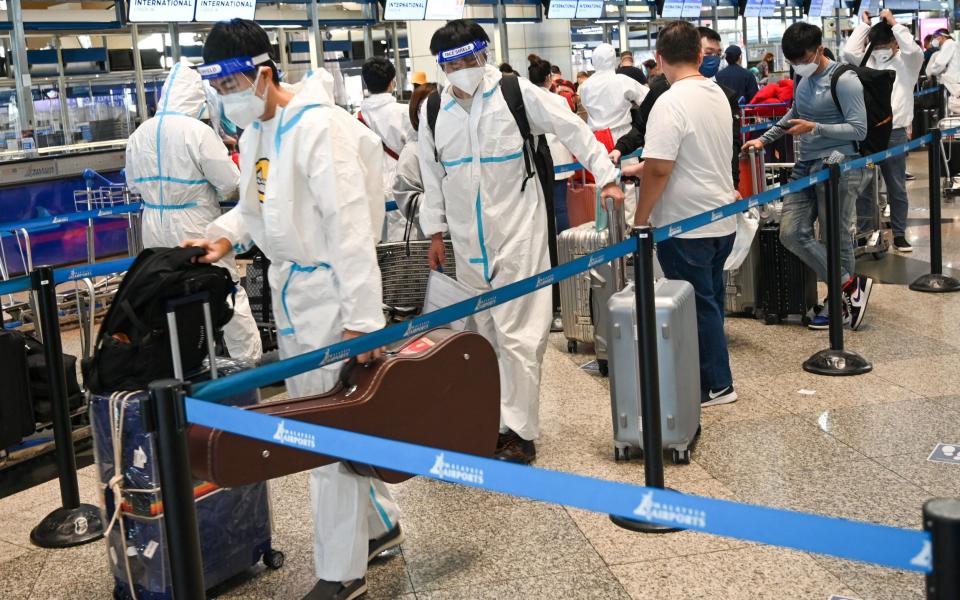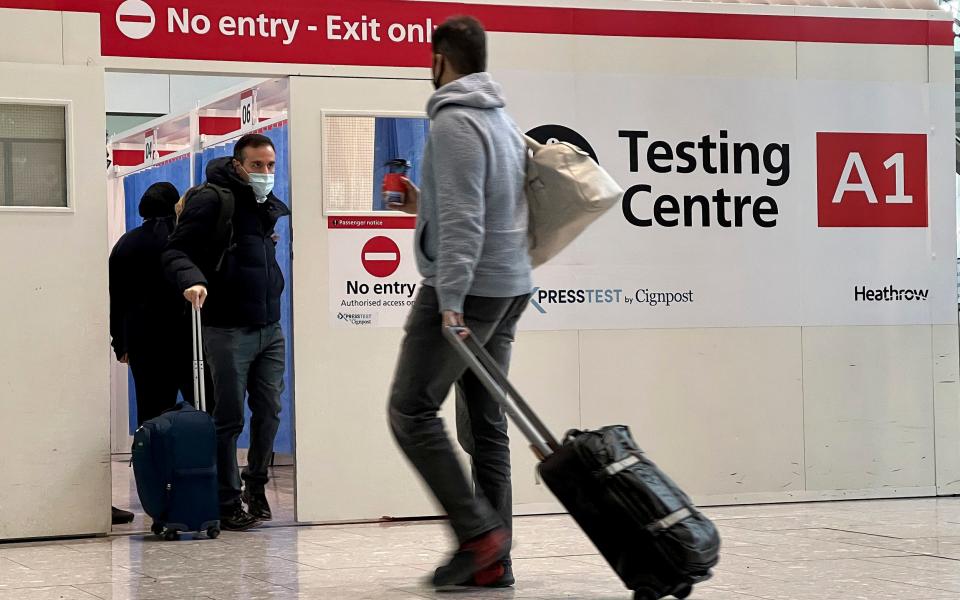How long will travel restrictions last, and other omicron questions that need answers

Travel restrictions are back. After months of loosening our shackles, permitting a slow but steady recovery for an industry that employs tens of millions of people around the world, the red list is back and testing requirements have been tightened.
Given that we don’t yet know whether the omicron variant is more transmissible than delta, whether it is more dangerous (early evidence suggests the opposite), or whether it is vaccine-resistant, the sudden imposition of measures smacks of panic. As such, there are plenty of questions that need to be answered.
Are travel restrictions already pointless?
Efforts to stem the tide of delta, including the widespread ban of flights from India, where it was first identified, proved fruitless. Just weeks after naming the variant, in May 2021, the World Health Organisation declared that it was already well on the way to becoming globally dominant. By August it had spread to just about every nation in the world, including those with strict border closures such as New Zealand, Australia and China.
Therefore, if omicron is even more transmissible than delta, attempts to stop it with travel restrictions will prove even more futile (if it is less transmissible than delta, restrictions will be equally pointless as it should be elbowed aside). The variant emerged in southern Africa, prompting the UK to put 10 countries in the region on the dreaded red list. But it is surely too late. Already nine cases have been identified in the UK, which means the true scale of the spread is likely to be far higher.
One could argue that we are slowing the spread of omicron, but even that is debatable. Stefan Baral, an epidemiologist at Johns Hopkins Bloomberg School of Public Health, argued that travel bans “have the effect of increasing travel in the short term – creating more desperation in potentially hiding symptoms, more crowded conditions at airports, as well as full airplanes. My guess is [this] increased the seeding across the US in early 2020.”
He added: “By the time you close the borders, the variant is already there. Travel bans may have a role in the syndromic (early) phase of an epidemic. But the epidemiologic transition from travel to local transmission happens quickly. Blaming outsiders may be easy, but addressing determinants of local transmission is impactful.”
Why is the world picking on Africa?
The variant has already been found in at least 15 nations, including the Netherlands, Hong Kong, Germany, Israel and Australia. Yet most countries’ travel restrictions – including Britain’s – focus solely on Africa. Indeed, no omicron infections have been identified in eight of the 10 red list countries – they have simply been added due to geography – yet the Netherlands, which has 13 confirmed cases and numerous direct flights to Africa, has been spared.
Dr Ayoade Alakija, co-chair of the Africa Vaccine Delivery Alliance, was apoplectic about the situation in an interview with BBC News last week. She said: “These travel bans are based in politics, and not in science. It is wrong. Why are we locking away Africa when this virus is already on three continents?
“What is going on right now is inevitable, it’s a result of the world’s failure to vaccinate in an equitable, urgent and speedy manner. It is as a result of hoarding [of vaccines] by high-income countries of the world, and quite frankly it is unacceptable.”
Spoke to @BBCWorld earlier today about #VirusVariantsVaccine #VaccineApartheid Inequity & Injustice. Thanks to Philippa Thomas for inviting me on. This is NOT the answer, we need Global Solidarity and we need it NOW! pic.twitter.com/aI9DhnDF6n
— Dr. Ayoade Alakija (@yodifiji) November 27, 2021
In many African countries, where furlough schemes and extensive personal savings are rare, travel restrictions can be devastating on those who rely on overseas visitors.
“For so many Africans dependent on tourism, the UK Government’s drastic decision will be devastating,” says Sarah Marshall, Telegraph Travel’s Africa expert, who has spent much of the pandemic visiting the continent and assessing the impact of restrictions. “Having barely been given an opportunity to recover from 20 months of crippling travel bans, camps, operators and communities will be wondering how to deal with this latest blow.”
Are travel bans actually counterproductive to the policing of variants?
The heavy-handed response to omicron will damage the economies of South Africa and Botswana, the two countries that worked together to identify it. What message does that give to governments elsewhere? Where is the incentive to sequence the Covid virus?
This is a point made by Prof Francois Balloux, director at the UCL Genetics Institute. He said: “Botswana and South Africa have remarkably good SARSCoV2 variant surveillance in place. Their scientists have been proactive and transparent about the emergence of B.1.1.529. The predictable – and up to a point understandable – international response has been ‘shut the borders’. An unintended side-effect of such a 'punitive' response may be to disincentive global SARSCoV2 surveillance or at least make them think twice before sharing data. At the very least, the punitive measure of border closure should be counterbalanced by positive incentives, such as support for their genomic surveillance programmes and far more generous help with the healthcare challenges they are currently facing.”

Why are some countries blaming vaccinated travellers?
Spain responded to the emergence of omicron by banning unvaccinated British tourists, who previously could visit if they presented evidence of a negative test. This is a curious tactic given that the variant has been identified in vaccinated people (Australia – which only grants entry to double-jabbed travellers – has registered five imported cases) and that much of the concern surrounding it is down to the possibility that it could escape the current crop of vaccines. It seems that the policy favoured by many countries of banning unvaccinated travellers – even though the jabs don’t prevent transmission – continues to find favour as a political tool.
Whether that remains the case if omicron is found to comprehensively bypass the vaccines, we can only guess. But logic dictates that it shouldn’t.
Will the UK enforce the new self-isolation period?
Having permitted vaccinated Britons returning from overseas to take just a single lateral flow test in the 48 hours after they return (with no mandatory quarantine period), the new rules – effective from 4am on November 30 – require them to take a costlier PCR test and to wait at home until they receive a negative result. This could mean a few hours of self-isolation, or a few days (or longer if the test results are delayed). But how strictly will this quarantine period be enforced? Having wound down its travel restrictions in recent months, one can only assume that there is a shortage of quarantine martinets within the bowels of the Home Office. Will there be enough to check up on the hundreds of thousands of Britons returning from city breaks, winter sun sojourns and ski holidays in the coming weeks?
How long will these rules remain in place?
Thousands of holidays have already been ruined by the new rules, but that will extend to hundreds of thousands if they linger into the key festive period and the ski season. Apparently they will be reviewed in three weeks (around December 17), when fears about omicron will have hopefully been laid to rest, but few will have any confidence in a quick return to normal on that date. After all, we’ve been told before of Covid measures lasting just three weeks…
Holidaymakers will be understandably nervous, but so too will travel businesses. With the furlough scheme wrapped up, many tour operators will not survive another lean winter.
Edward Argar, Minister of State for Health, said: “We’re not saying cancel your holidays to France or other countries, but we have put in place proportionate testing and border controls.
“We cannot say what will happen over the coming weeks, and in travelling at the moment with this virus, particularly with a new variant around, there is an element of risk.”
Is this how we will deal with future variants?
The sudden closure of borders is not sustainable in a global economy. It is bad for business, bad for people’s mental health, and many will be worried that it risks becoming our fallback response.
Former British Airways boss Willie Walsh, who now leads airline industry body IATA, today called the Government’s decision “knee-jerk”, and said he was “very disappointed” at the move, arguing it would not have any long-term benefit.
He told BBC Radio 4: “It’s clear that these measures have been completely ineffective in the past but impose huge hardship on people who are trying to connect with family and friends and clearly massive financial damage to the tourism and airline industry.”
The airline chief argued that the UK would fail to keep out the virus as the borders remained open, arguing that a “sensible testing regime” should be imposed instead.

